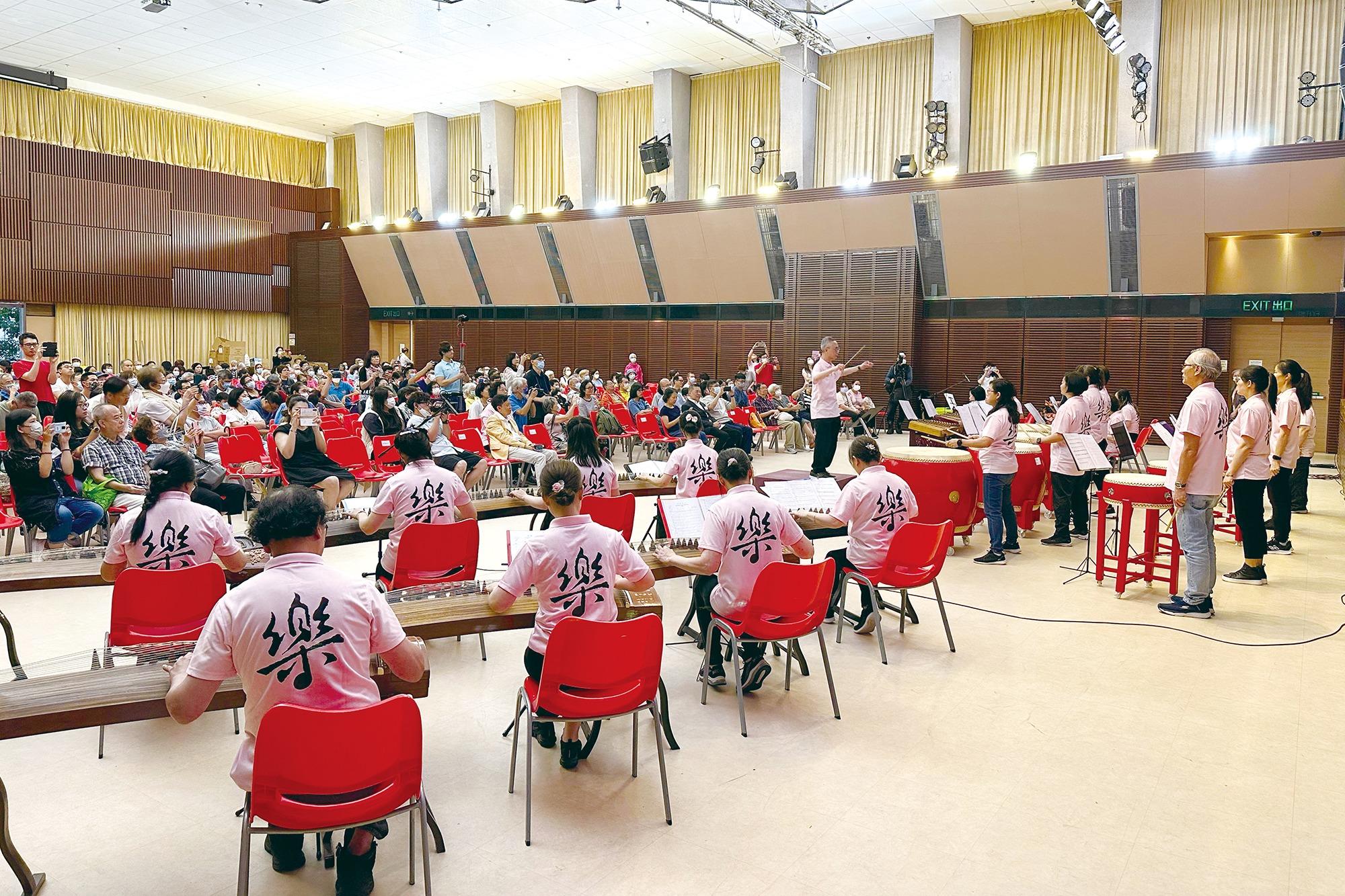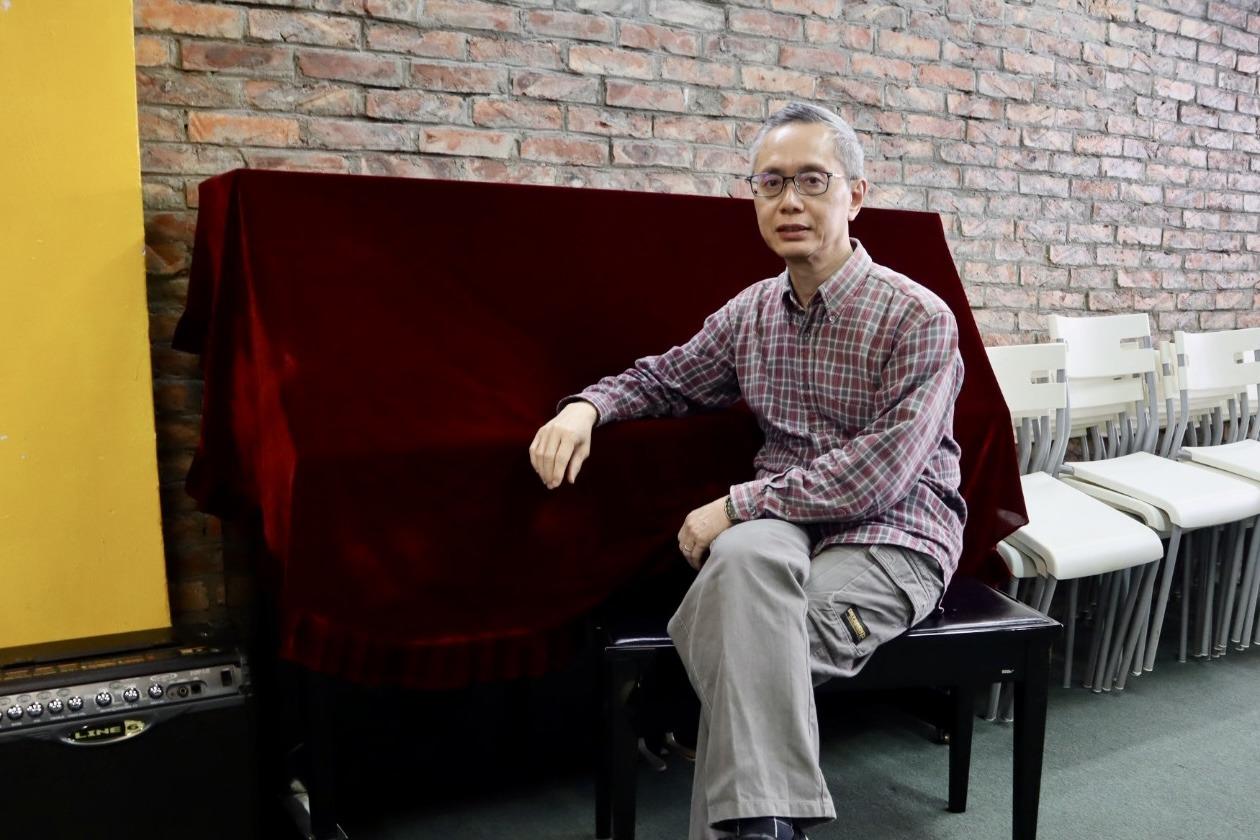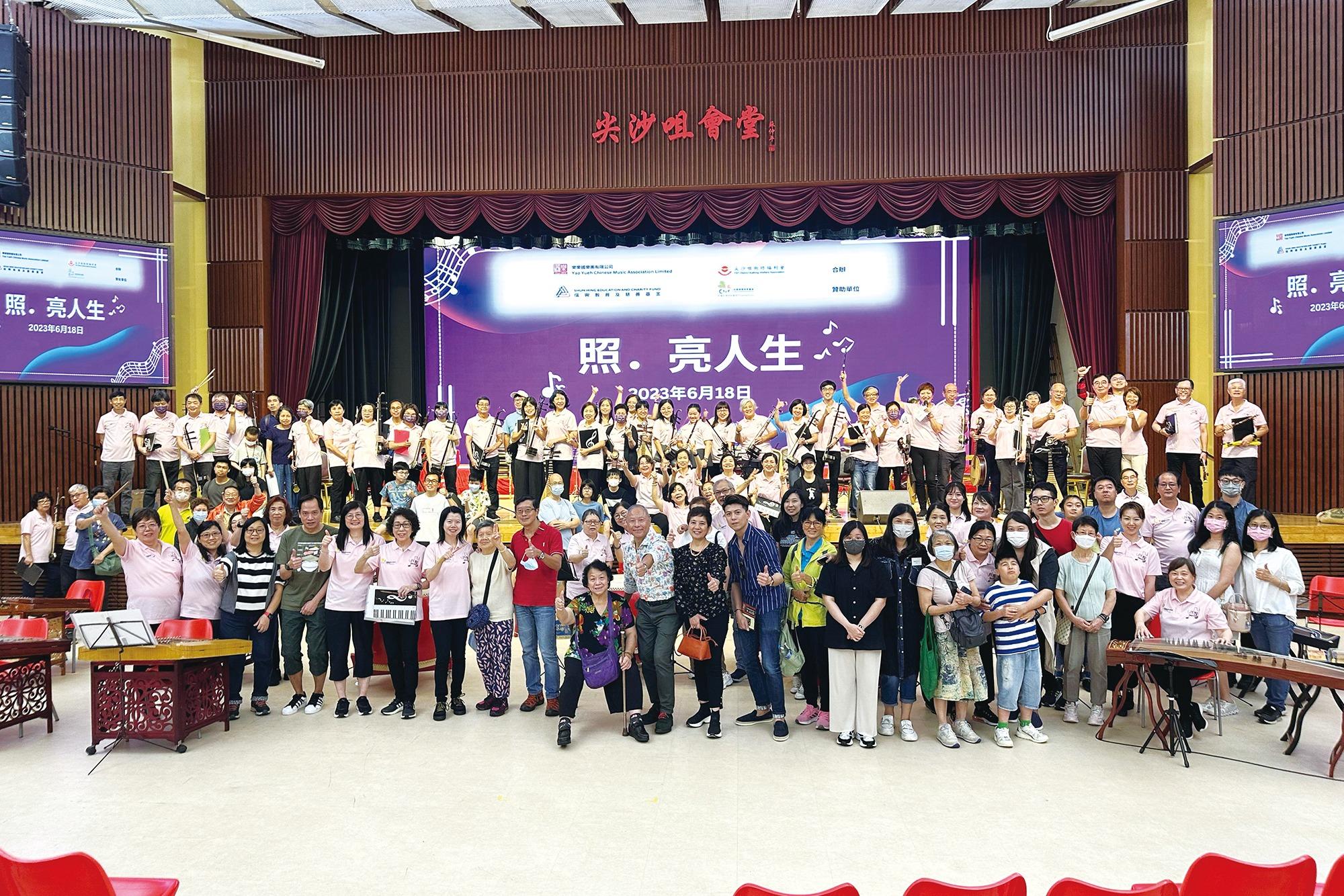Caregivers in Hong Kong band together as musicians to find solace and connect with others to share their experiences. Xi Tianqi reports from Hong Kong.
 Members of the Carers Orchestra play Chinese instruments in a community hall in Tsim Sha Tsui, Hong Kong, in June. (PROVIDED TO CHINA DAILY)
Members of the Carers Orchestra play Chinese instruments in a community hall in Tsim Sha Tsui, Hong Kong, in June. (PROVIDED TO CHINA DAILY)
Thunderous applause reverberated around a community hall in Tsim Sha Tsui in June as the Carers Orchestra — a group of amateur musicians — took to the stage.
Some of them only began practicing three years ago. The makeshift Chinese orchestra — the only one of its kind in Hong Kong — numbers middle-aged and even elderly among its members.
Music offers a unique form of rooted support. It can offer continuity of care, providing a creative outlet and a sense of community that can help improve the emotional well-being of caregivers.
Leung Chi-cheung, music director and principal conductor of the Carers Orchestra
Among them is Kwan Lai-mei, a 66-year-old housewife, who plays the erhu, also known as the “Chinese violin” — a two-stringed musical instrument played with a bow. The resounding applause lifted Kwan from her primary role in life as a caregiver. At that moment, she was herself — a music lover and not someone else’s wife, daughter-in-law or mother, taking a break from her years of caring for the sick and the elderly.
Kwan’s 86-year-old mother-in-law was diagnosed with dementia in 2016, forcing her to assume the arduous task of caring for her elderly relative. A double whammy followed when her father-in-law came down with Parkinson’s disease.
Kwan and her husband had no choice but to shoulder the task of looking after them. The stressful responsibilities have taken their toll on the couple as they’ve aged rapidly themselves while carrying out their filial duties.
Kwan’s mother-in-law, whose dementia has advanced from moderate to severe over the years, adds a further complication to the caregiver’s life. Every day, Kwan has to reply to the same questions that she raises repeatedly. For example, Kwan always attends to the 86-year-old while she’s eating, but she still asks whether Kwan will accompany her at meal times. “I have to be patient enough to answer every question from my mother-in-law as if it were the first time,” says Kwan.
Kwan is among some 1.12 million selfless caregivers in Hong Kong dedicating their time and energy to tending to the needs of their elderly relatives. In November 2022, she attended a performance by the Carers Orchestra along with her caregiver friends.
Established by the Yao Yueh Chinese Music Association (YYCMA) in 2020 as a caregivers’ support program, the orchestra offers a platform for them to come together, express their feelings through music, and connect with others who share similar experiences.
By immersing herself in music, Kwan has been able to brush aside her disquiet and worries and find solace in the get-together.
Leung Chi-cheung — the orchestra’s music director and principal conductor — is also the coordinator of the three-year program which has helped more than 1,000 caregivers and volunteers since July 2020.
He says that holding regular weekly rehearsals brings a group of caregivers together to offer them space to socialize and share their experiences.
Such programs have improved their relationships with their families by alleviating the caregivers’ chronic stress. The stage performances can inspire and motivate other family members, providing a sense of pride and accomplishment that helps the caregivers to continue in their responsibilities.
Nigel Pang Wai-lun, vice-chairman of the YYCMA and who was instrumental in setting up the Carers Orchestra, says the ensemble’s role is crucial in comforting people during challenging times.
While most leisure activities put up the shutters during the crippling three-year-long COVID-19 pandemic, the band remained a constant source of support and consolation for caregivers.
Although COVID-19 made it hard for the musicians to practice together physically, well-wishers donated musical instruments that were sent to their homes to enable them to cooperate online. Members of the orchestra still continued to meet weekly to allow caregivers to connect.
 Leung Chi-cheung, music director and principal conductor of the Carers Orchestra. (PROVIDED TO CHINA DAILY)
Leung Chi-cheung, music director and principal conductor of the Carers Orchestra. (PROVIDED TO CHINA DAILY)
Demanding task
Shi Cheng, a research assistant professor with the Institute of Policy Studies at Lingnan University, says the traditional culture of filial piety has led most family members in Hong Kong to take up the sometimes arduous duty of caring for their elderly relatives.
According to a 2021 Population Census thematic report on older people, about 226,000 elderly long-term care recipients in Hong Kong had spouses, children, sons- and daughters-in-law who were acting as their primary caregivers.
The importance of filial piety in dementia caregiving cannot be overstated as family members often serve as primary carers providing constant supervision, says Shi.
Andrew Leung Kin-pong, Hong Kong’s former director of social welfare, says the demand for dementia caregiving has gone up significantly in recent years. According to the Hong Kong mental morbidity survey for older people, 178,129 were individuals suffering from dementia in Hong Kong in 2021, compared with an estimated 63,000 patients with cognitive impairment in 2011.
The sharp increase in the number of elderly people with dementia within a decade is attributable to the city’s rapidly graying population.
Official data project that the number of residents aged 65 and above in Hong Kong would see a significant surge, rising from 1.17 million in mid-2016 to 2.45 million by mid-2039. The demographic shift is likely to impose a substantial economic and social burden on the community in the coming decades.
A study conducted in 2010 estimated that the cost of institutional care for those aged 60 and above with dementia would escalate from HK$1.6 billion ($205 million) in 2010 to HK$4.2 billion in 2036. Similarly, the cost of families with care needs is projected to rise from HK$10.4 billion in 2010 to HK$27 billion in 2036.
The prevalence of aging and cognitive diseases among elders has led to higher demand for caregivers with professional nursing skills to help the elderly with various health problems, such as Alzheimer’s, Parkinson’s disease and mobility impairment.
And, with a growing number of Hong Kong residents opting not to have children, the city needs to have more nursing homes that provide professional caring services for them, says Andrew Leung.
Compared with caregivers for healthy elders, Shi warns that they face greater mental health risks when caring for someone with either physical or cognitive impairment.
For example, when caring for elderly people with dementia, studies have shown that caregivers are at a higher risk of becoming burned-out, depressed or having to face other emotional problems.
According to Shi, when elderly people’s cognitive impairment reaches an advanced stage, the patients would be reluctant to take a bath and become grumpy. However, if family carers could understand the development trend of the disease, they would realize this is normal and face up to the reality.
For family members tasked with caring for those with dementia, the caring time for each patient would increase as the disease progresses. It’s estimated this would surge from 4.2 hours to 6.6 hours per day as the disease worsens.
Studies have shown that the monthly care time for a dementia patient is up to 400 hours when, in most cases, the caretaking roles are undertaken by more than one family member.
In extreme cases, caregivers have resorted to suicide or attacking patients they were supposedly looking after. In the first nine months of 2023, there were at least six cases of deaths among family members related to caregivers in Hong Kong. In May, a 66-year-old man committed suicide after attempting to use a plastic bag to suffocate his 39-year-old daughter, who was suffering from a brain disease.
In view of the mounting pressure on caregivers in a family, a sense of belonging and empowerment could be achieved through peer support networks by sharing their experiences, and offering morale boosting from those undergoing similar experience, says Shi. She suggests that the government and the community pay more attention to caregivers who are, in most cases, neglected, when allocating resources and support for those under care.
 The Carers Orchestra poses for a group photo with the audience. The ensemble, which consists mostly of caregivers, was set up by the Yao Yueh Chinese Music Association in 2020 as a support program for those dedicating their time and energy to looking after others. (PROVIDED TO CHINA DAILY)
The Carers Orchestra poses for a group photo with the audience. The ensemble, which consists mostly of caregivers, was set up by the Yao Yueh Chinese Music Association in 2020 as a support program for those dedicating their time and energy to looking after others. (PROVIDED TO CHINA DAILY)
Breathing space
A report by the Hong Kong Polytechnic University in 2022 showed that enhancing a caregiver’s competence requires affirming the caregiver’s role, ability and contribution, and enhancing his or her personal strengths and self-confidence in coping with difficulties.
The study recommended fostering carer-friendly neighborhoods and workplaces, as well as devising an evaluation mechanism to comprehensively understand the requirements of caregivers.
Kwan’s participation in the orchestra is a good case in point. Through musical performances, such projects raise public awareness of caregivers’ needs, explains Cheung Fung-ming, project officer of the Carers Support Program under the YYCMA.
He says the community plays an important role in encouraging neighbors to help each other, as this can’t be achieved by any single organization alone.
Leung Chi-cheung notes that while many social organizations provide practical support for caregivers, music offers a unique form of rooted support. He says there is still a lack of spiritual support in society, and it is not feasible to provide thousands of caregivers with psychological counseling every day. However, music can offer continuity of care, providing a creative outlet and a sense of community that can help improve the emotional well-being of caregivers.
Another effective way to ease the pressure on caregivers is to allow them to take a break from their daily routines, and place those in their care at day respite centers or under residential services, Shi suggests.
As of November, there were 7,696 applicants on the waiting list for various types of subsidized long-term community care services for the elderly, according to the Social Welfare Department.
The average waiting periods for integrated home care services (frail cases) and enhanced home and community care services were seven months, while it was three months for day care centers for the elderly.
Andrew Leung agrees that there are inadequate caring facilities in Hong Kong, particularly for families who cannot afford to hire private nurses or domestic helpers.
Besides adding more nursing care facilities, he suggests that the distribution of community care service vouchers for the elderly should be extended to cover more facilities.
The tragic deaths of caretakers taking their own lives have sounded the alarm bell for the community, and are seen as an open cry for help.
The special administrative region government recently launched a 24-hour hotline to provide professional assistance, and introduced a convenient information gateway for caregivers to inform them about the resources available, and to encourage them to seek help whenever needed.
Shi says Hong Kong should take its cue from other regions that have revised their laws for caregivers. The United Kingdom passed the Care Act in 2014, which clearly stipulates that the government should not only support people with care needs, but also consider the health of family caregivers and help them.
In the UK and Japan, caregivers get respite care, training and emotional assistance to help them manage their responsibilities. The Japanese government has set up “dementia cafes” in local communities, where dementia patients and their caregivers can socialize in a relaxed and familiar setting.
Dementia cafes are also present on the Chinese mainland, where some patients who are in better condition also act as staff to allow them to keep engaged with the community.
For Kwan, a brief respite from her stressful drudgery is definitely not the ultimate panacea. But she has gradually become convinced about the meaning of life in her role as a caregiver.
Contact the writer at lindaxi@chinadailyhk.com


